Cultural and Historical Perspectives on Old Age and Challenges
VerifiedAdded on 2020/12/23
|10
|3010
|244
Essay
AI Summary
This essay delves into the multifaceted nature of old age, examining how its representations and experiences vary across different cultures and throughout history. It explores the sociological perspectives on aging, including the impact of cultural upbringing, family dynamics, and societal attitudes. The essay discusses various theories of aging, such as the disengagement, activity, and continuity theories, providing a comprehensive understanding of the aging process. Furthermore, it highlights the significant challenges faced by individuals and societies in an aging world, encompassing issues related to dependency, health, and social integration. The essay underscores the importance of understanding these complexities to foster a more inclusive and supportive environment for the elderly. This essay is contributed by a student and is available on Desklib, a platform providing AI-based study tools for students.
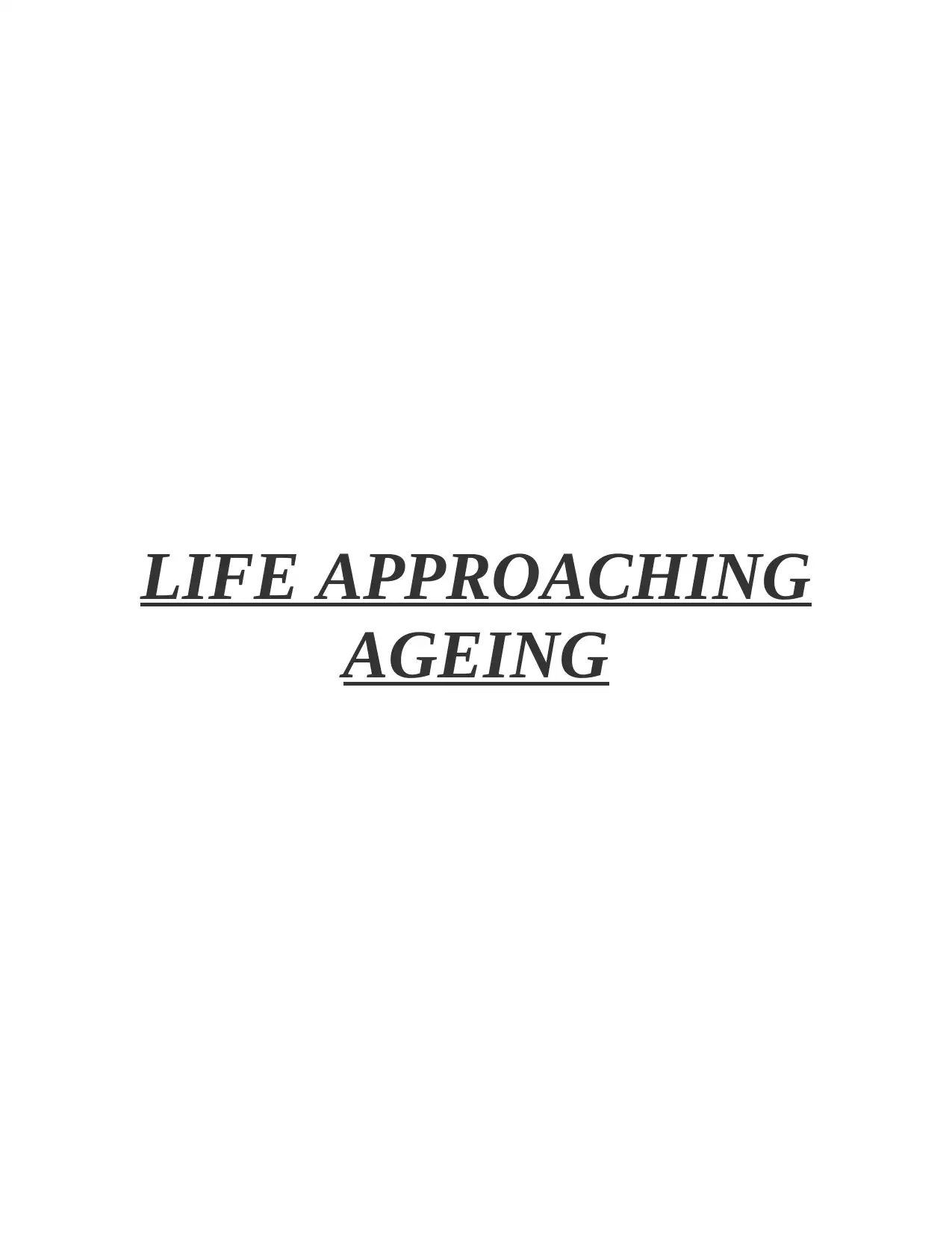
LIFE APPROACHING
AGEING
AGEING
Paraphrase This Document
Need a fresh take? Get an instant paraphrase of this document with our AI Paraphraser
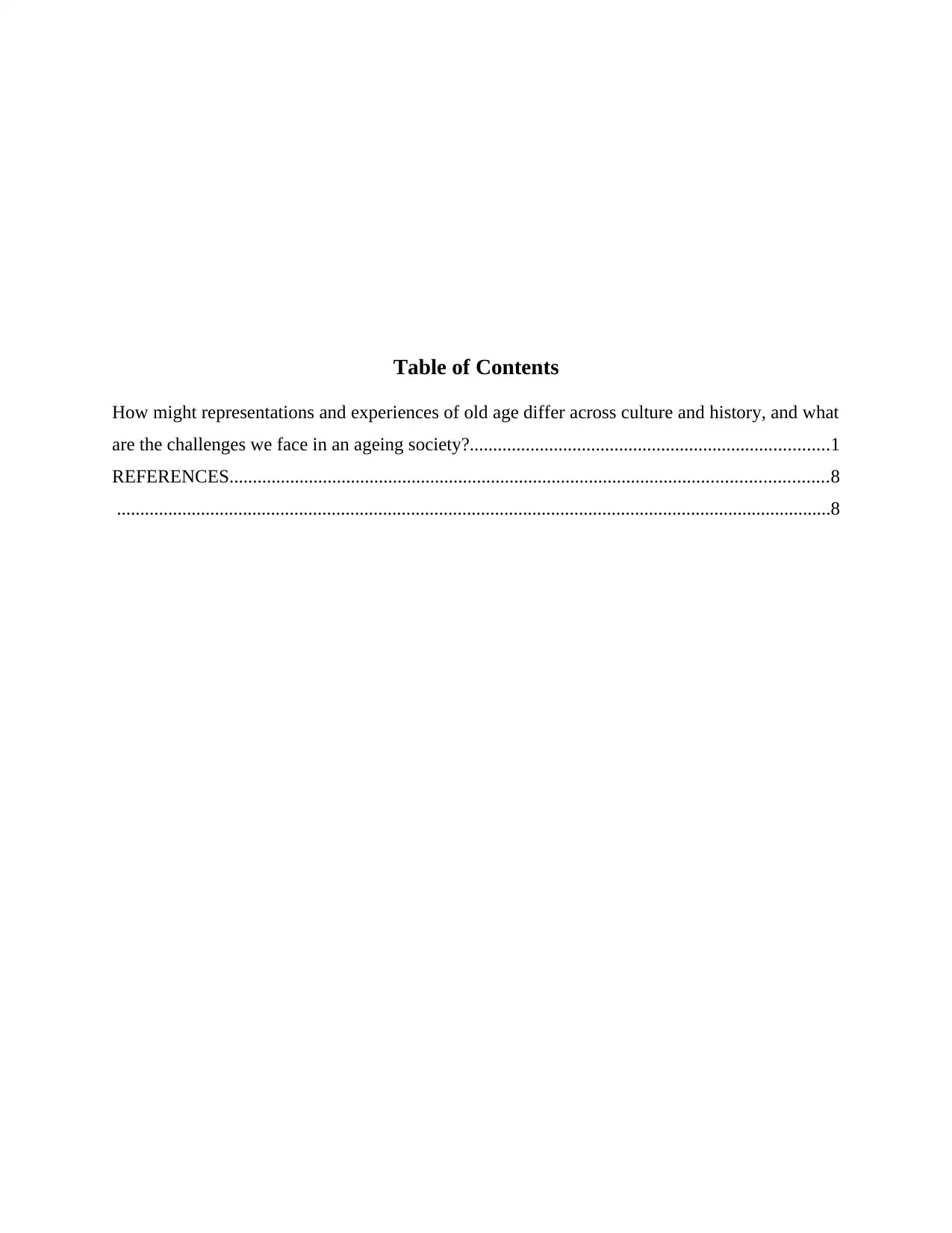
Table of Contents
How might representations and experiences of old age differ across culture and history, and what
are the challenges we face in an ageing society?.............................................................................1
REFERENCES................................................................................................................................8
.........................................................................................................................................................8
How might representations and experiences of old age differ across culture and history, and what
are the challenges we face in an ageing society?.............................................................................1
REFERENCES................................................................................................................................8
.........................................................................................................................................................8
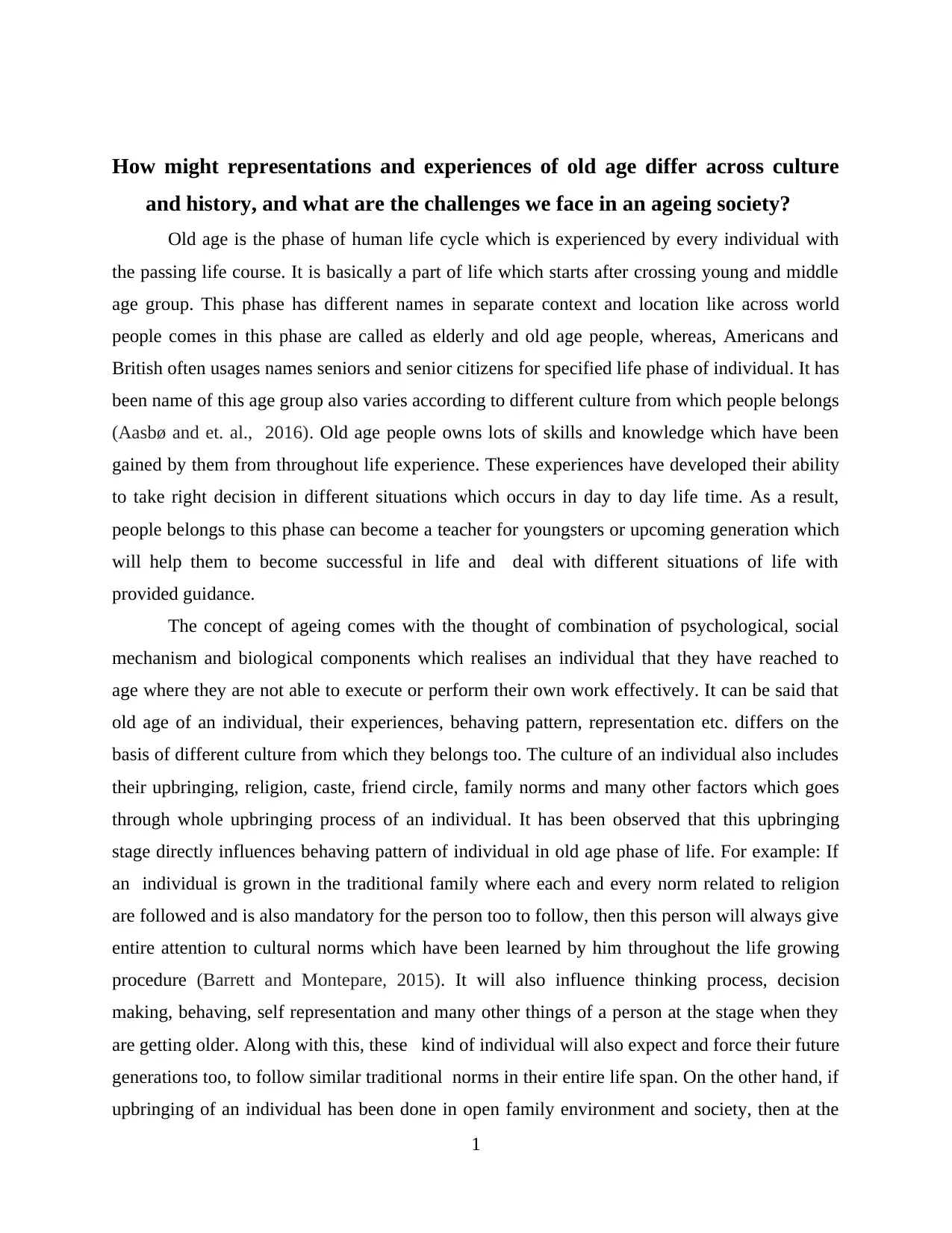
How might representations and experiences of old age differ across culture
and history, and what are the challenges we face in an ageing society?
Old age is the phase of human life cycle which is experienced by every individual with
the passing life course. It is basically a part of life which starts after crossing young and middle
age group. This phase has different names in separate context and location like across world
people comes in this phase are called as elderly and old age people, whereas, Americans and
British often usages names seniors and senior citizens for specified life phase of individual. It has
been name of this age group also varies according to different culture from which people belongs
(Aasbø and et. al., 2016). Old age people owns lots of skills and knowledge which have been
gained by them from throughout life experience. These experiences have developed their ability
to take right decision in different situations which occurs in day to day life time. As a result,
people belongs to this phase can become a teacher for youngsters or upcoming generation which
will help them to become successful in life and deal with different situations of life with
provided guidance.
The concept of ageing comes with the thought of combination of psychological, social
mechanism and biological components which realises an individual that they have reached to
age where they are not able to execute or perform their own work effectively. It can be said that
old age of an individual, their experiences, behaving pattern, representation etc. differs on the
basis of different culture from which they belongs too. The culture of an individual also includes
their upbringing, religion, caste, friend circle, family norms and many other factors which goes
through whole upbringing process of an individual. It has been observed that this upbringing
stage directly influences behaving pattern of individual in old age phase of life. For example: If
an individual is grown in the traditional family where each and every norm related to religion
are followed and is also mandatory for the person too to follow, then this person will always give
entire attention to cultural norms which have been learned by him throughout the life growing
procedure (Barrett and Montepare, 2015). It will also influence thinking process, decision
making, behaving, self representation and many other things of a person at the stage when they
are getting older. Along with this, these kind of individual will also expect and force their future
generations too, to follow similar traditional norms in their entire life span. On the other hand, if
upbringing of an individual has been done in open family environment and society, then at the
1
and history, and what are the challenges we face in an ageing society?
Old age is the phase of human life cycle which is experienced by every individual with
the passing life course. It is basically a part of life which starts after crossing young and middle
age group. This phase has different names in separate context and location like across world
people comes in this phase are called as elderly and old age people, whereas, Americans and
British often usages names seniors and senior citizens for specified life phase of individual. It has
been name of this age group also varies according to different culture from which people belongs
(Aasbø and et. al., 2016). Old age people owns lots of skills and knowledge which have been
gained by them from throughout life experience. These experiences have developed their ability
to take right decision in different situations which occurs in day to day life time. As a result,
people belongs to this phase can become a teacher for youngsters or upcoming generation which
will help them to become successful in life and deal with different situations of life with
provided guidance.
The concept of ageing comes with the thought of combination of psychological, social
mechanism and biological components which realises an individual that they have reached to
age where they are not able to execute or perform their own work effectively. It can be said that
old age of an individual, their experiences, behaving pattern, representation etc. differs on the
basis of different culture from which they belongs too. The culture of an individual also includes
their upbringing, religion, caste, friend circle, family norms and many other factors which goes
through whole upbringing process of an individual. It has been observed that this upbringing
stage directly influences behaving pattern of individual in old age phase of life. For example: If
an individual is grown in the traditional family where each and every norm related to religion
are followed and is also mandatory for the person too to follow, then this person will always give
entire attention to cultural norms which have been learned by him throughout the life growing
procedure (Barrett and Montepare, 2015). It will also influence thinking process, decision
making, behaving, self representation and many other things of a person at the stage when they
are getting older. Along with this, these kind of individual will also expect and force their future
generations too, to follow similar traditional norms in their entire life span. On the other hand, if
upbringing of an individual has been done in open family environment and society, then at the
1
⊘ This is a preview!⊘
Do you want full access?
Subscribe today to unlock all pages.

Trusted by 1+ million students worldwide
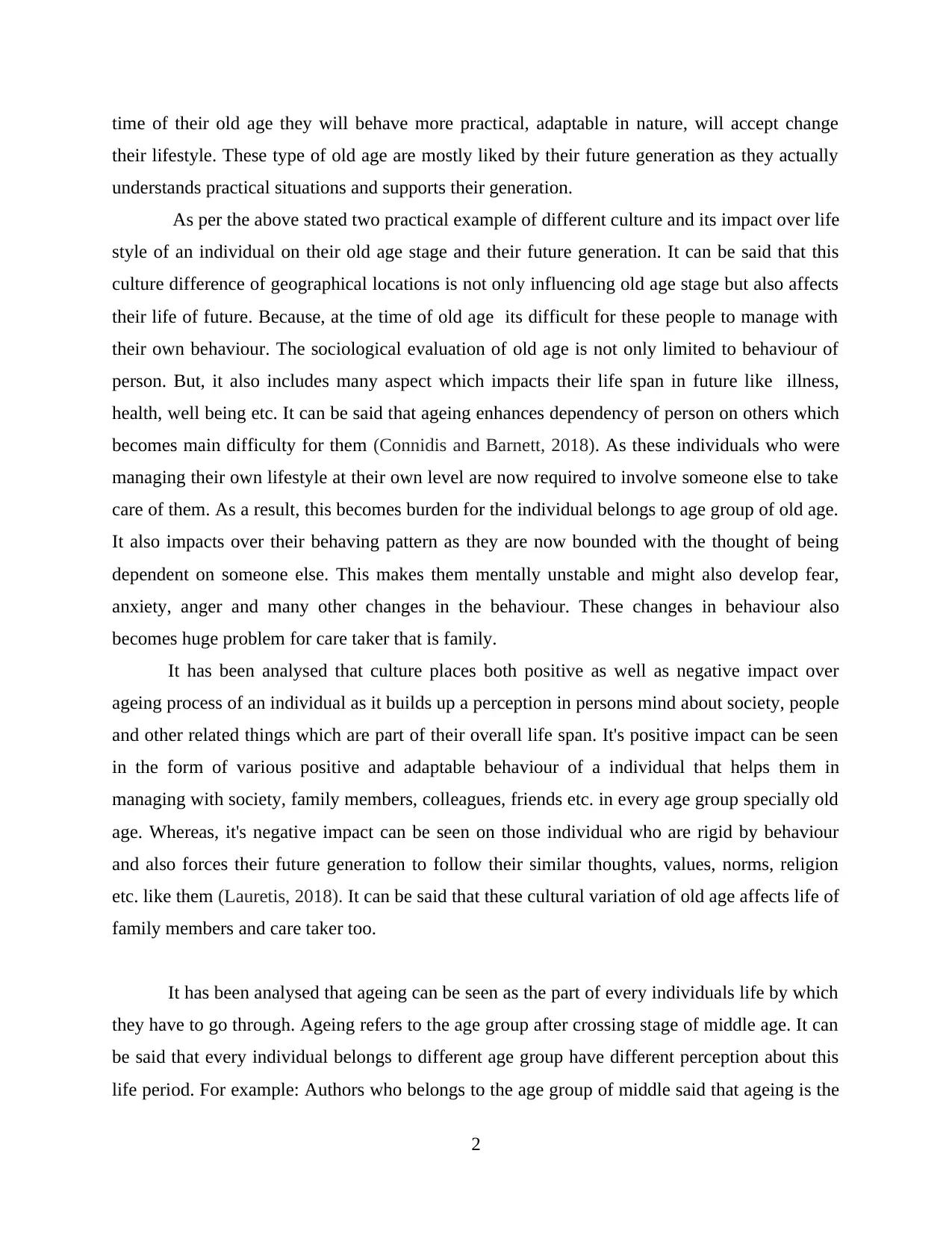
time of their old age they will behave more practical, adaptable in nature, will accept change
their lifestyle. These type of old age are mostly liked by their future generation as they actually
understands practical situations and supports their generation.
As per the above stated two practical example of different culture and its impact over life
style of an individual on their old age stage and their future generation. It can be said that this
culture difference of geographical locations is not only influencing old age stage but also affects
their life of future. Because, at the time of old age its difficult for these people to manage with
their own behaviour. The sociological evaluation of old age is not only limited to behaviour of
person. But, it also includes many aspect which impacts their life span in future like illness,
health, well being etc. It can be said that ageing enhances dependency of person on others which
becomes main difficulty for them (Connidis and Barnett, 2018). As these individuals who were
managing their own lifestyle at their own level are now required to involve someone else to take
care of them. As a result, this becomes burden for the individual belongs to age group of old age.
It also impacts over their behaving pattern as they are now bounded with the thought of being
dependent on someone else. This makes them mentally unstable and might also develop fear,
anxiety, anger and many other changes in the behaviour. These changes in behaviour also
becomes huge problem for care taker that is family.
It has been analysed that culture places both positive as well as negative impact over
ageing process of an individual as it builds up a perception in persons mind about society, people
and other related things which are part of their overall life span. It's positive impact can be seen
in the form of various positive and adaptable behaviour of a individual that helps them in
managing with society, family members, colleagues, friends etc. in every age group specially old
age. Whereas, it's negative impact can be seen on those individual who are rigid by behaviour
and also forces their future generation to follow their similar thoughts, values, norms, religion
etc. like them (Lauretis, 2018). It can be said that these cultural variation of old age affects life of
family members and care taker too.
It has been analysed that ageing can be seen as the part of every individuals life by which
they have to go through. Ageing refers to the age group after crossing stage of middle age. It can
be said that every individual belongs to different age group have different perception about this
life period. For example: Authors who belongs to the age group of middle said that ageing is the
2
their lifestyle. These type of old age are mostly liked by their future generation as they actually
understands practical situations and supports their generation.
As per the above stated two practical example of different culture and its impact over life
style of an individual on their old age stage and their future generation. It can be said that this
culture difference of geographical locations is not only influencing old age stage but also affects
their life of future. Because, at the time of old age its difficult for these people to manage with
their own behaviour. The sociological evaluation of old age is not only limited to behaviour of
person. But, it also includes many aspect which impacts their life span in future like illness,
health, well being etc. It can be said that ageing enhances dependency of person on others which
becomes main difficulty for them (Connidis and Barnett, 2018). As these individuals who were
managing their own lifestyle at their own level are now required to involve someone else to take
care of them. As a result, this becomes burden for the individual belongs to age group of old age.
It also impacts over their behaving pattern as they are now bounded with the thought of being
dependent on someone else. This makes them mentally unstable and might also develop fear,
anxiety, anger and many other changes in the behaviour. These changes in behaviour also
becomes huge problem for care taker that is family.
It has been analysed that culture places both positive as well as negative impact over
ageing process of an individual as it builds up a perception in persons mind about society, people
and other related things which are part of their overall life span. It's positive impact can be seen
in the form of various positive and adaptable behaviour of a individual that helps them in
managing with society, family members, colleagues, friends etc. in every age group specially old
age. Whereas, it's negative impact can be seen on those individual who are rigid by behaviour
and also forces their future generation to follow their similar thoughts, values, norms, religion
etc. like them (Lauretis, 2018). It can be said that these cultural variation of old age affects life of
family members and care taker too.
It has been analysed that ageing can be seen as the part of every individuals life by which
they have to go through. Ageing refers to the age group after crossing stage of middle age. It can
be said that every individual belongs to different age group have different perception about this
life period. For example: Authors who belongs to the age group of middle said that ageing is the
2
Paraphrase This Document
Need a fresh take? Get an instant paraphrase of this document with our AI Paraphraser
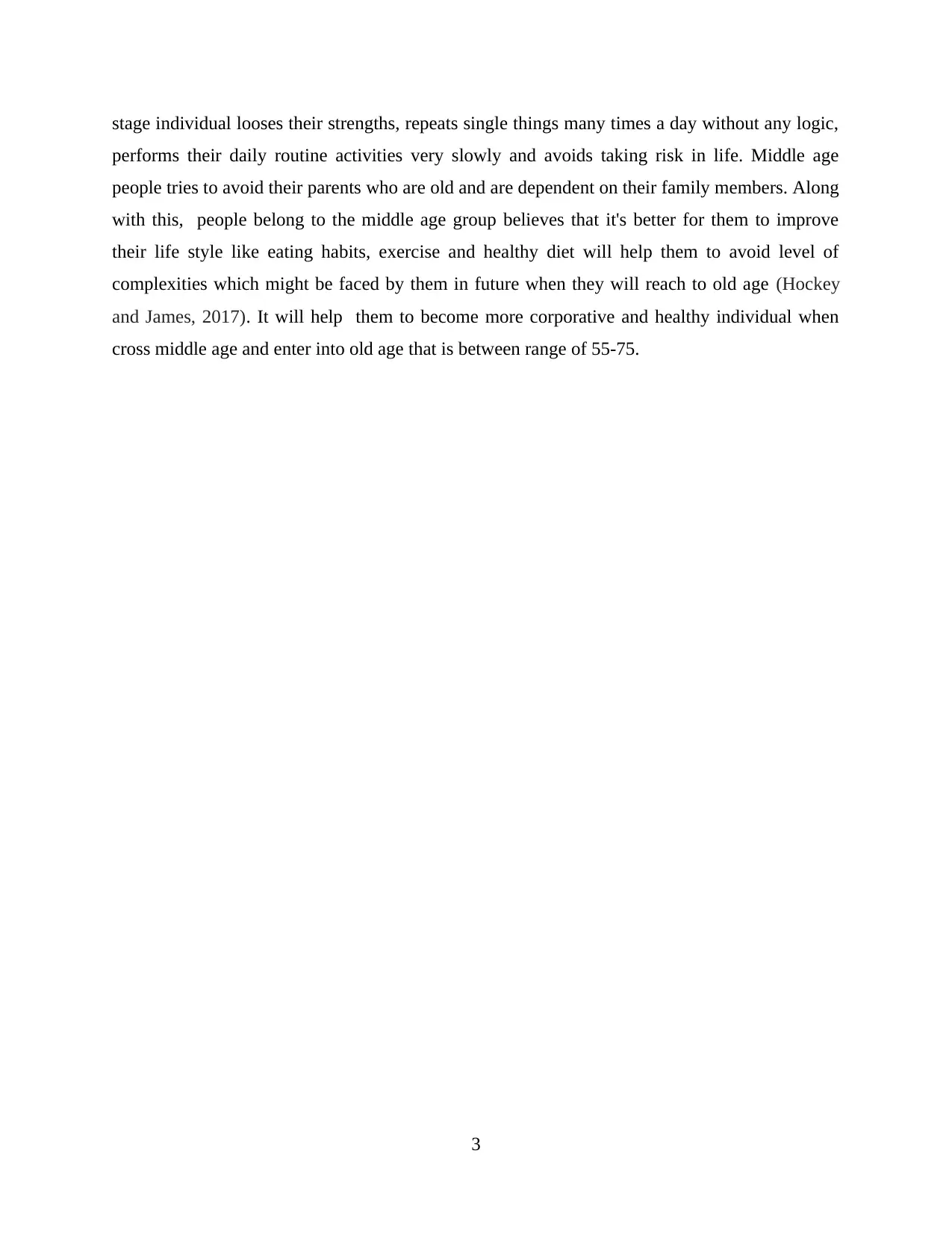
stage individual looses their strengths, repeats single things many times a day without any logic,
performs their daily routine activities very slowly and avoids taking risk in life. Middle age
people tries to avoid their parents who are old and are dependent on their family members. Along
with this, people belong to the middle age group believes that it's better for them to improve
their life style like eating habits, exercise and healthy diet will help them to avoid level of
complexities which might be faced by them in future when they will reach to old age (Hockey
and James, 2017). It will help them to become more corporative and healthy individual when
cross middle age and enter into old age that is between range of 55-75.
3
performs their daily routine activities very slowly and avoids taking risk in life. Middle age
people tries to avoid their parents who are old and are dependent on their family members. Along
with this, people belong to the middle age group believes that it's better for them to improve
their life style like eating habits, exercise and healthy diet will help them to avoid level of
complexities which might be faced by them in future when they will reach to old age (Hockey
and James, 2017). It will help them to become more corporative and healthy individual when
cross middle age and enter into old age that is between range of 55-75.
3
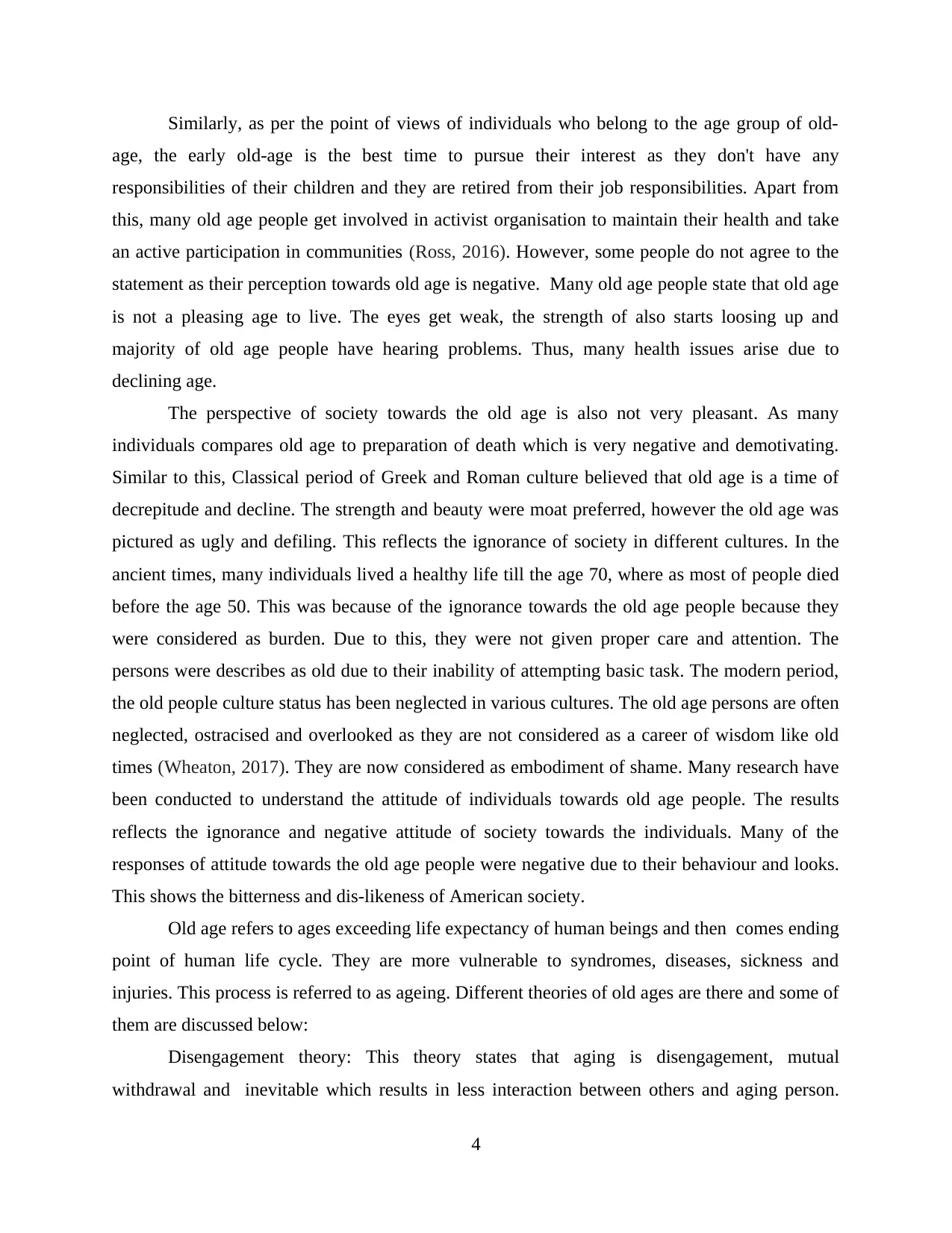
Similarly, as per the point of views of individuals who belong to the age group of old-
age, the early old-age is the best time to pursue their interest as they don't have any
responsibilities of their children and they are retired from their job responsibilities. Apart from
this, many old age people get involved in activist organisation to maintain their health and take
an active participation in communities (Ross, 2016). However, some people do not agree to the
statement as their perception towards old age is negative. Many old age people state that old age
is not a pleasing age to live. The eyes get weak, the strength of also starts loosing up and
majority of old age people have hearing problems. Thus, many health issues arise due to
declining age.
The perspective of society towards the old age is also not very pleasant. As many
individuals compares old age to preparation of death which is very negative and demotivating.
Similar to this, Classical period of Greek and Roman culture believed that old age is a time of
decrepitude and decline. The strength and beauty were moat preferred, however the old age was
pictured as ugly and defiling. This reflects the ignorance of society in different cultures. In the
ancient times, many individuals lived a healthy life till the age 70, where as most of people died
before the age 50. This was because of the ignorance towards the old age people because they
were considered as burden. Due to this, they were not given proper care and attention. The
persons were describes as old due to their inability of attempting basic task. The modern period,
the old people culture status has been neglected in various cultures. The old age persons are often
neglected, ostracised and overlooked as they are not considered as a career of wisdom like old
times (Wheaton, 2017). They are now considered as embodiment of shame. Many research have
been conducted to understand the attitude of individuals towards old age people. The results
reflects the ignorance and negative attitude of society towards the individuals. Many of the
responses of attitude towards the old age people were negative due to their behaviour and looks.
This shows the bitterness and dis-likeness of American society.
Old age refers to ages exceeding life expectancy of human beings and then comes ending
point of human life cycle. They are more vulnerable to syndromes, diseases, sickness and
injuries. This process is referred to as ageing. Different theories of old ages are there and some of
them are discussed below:
Disengagement theory: This theory states that aging is disengagement, mutual
withdrawal and inevitable which results in less interaction between others and aging person.
4
age, the early old-age is the best time to pursue their interest as they don't have any
responsibilities of their children and they are retired from their job responsibilities. Apart from
this, many old age people get involved in activist organisation to maintain their health and take
an active participation in communities (Ross, 2016). However, some people do not agree to the
statement as their perception towards old age is negative. Many old age people state that old age
is not a pleasing age to live. The eyes get weak, the strength of also starts loosing up and
majority of old age people have hearing problems. Thus, many health issues arise due to
declining age.
The perspective of society towards the old age is also not very pleasant. As many
individuals compares old age to preparation of death which is very negative and demotivating.
Similar to this, Classical period of Greek and Roman culture believed that old age is a time of
decrepitude and decline. The strength and beauty were moat preferred, however the old age was
pictured as ugly and defiling. This reflects the ignorance of society in different cultures. In the
ancient times, many individuals lived a healthy life till the age 70, where as most of people died
before the age 50. This was because of the ignorance towards the old age people because they
were considered as burden. Due to this, they were not given proper care and attention. The
persons were describes as old due to their inability of attempting basic task. The modern period,
the old people culture status has been neglected in various cultures. The old age persons are often
neglected, ostracised and overlooked as they are not considered as a career of wisdom like old
times (Wheaton, 2017). They are now considered as embodiment of shame. Many research have
been conducted to understand the attitude of individuals towards old age people. The results
reflects the ignorance and negative attitude of society towards the individuals. Many of the
responses of attitude towards the old age people were negative due to their behaviour and looks.
This shows the bitterness and dis-likeness of American society.
Old age refers to ages exceeding life expectancy of human beings and then comes ending
point of human life cycle. They are more vulnerable to syndromes, diseases, sickness and
injuries. This process is referred to as ageing. Different theories of old ages are there and some of
them are discussed below:
Disengagement theory: This theory states that aging is disengagement, mutual
withdrawal and inevitable which results in less interaction between others and aging person.
4
⊘ This is a preview!⊘
Do you want full access?
Subscribe today to unlock all pages.

Trusted by 1+ million students worldwide
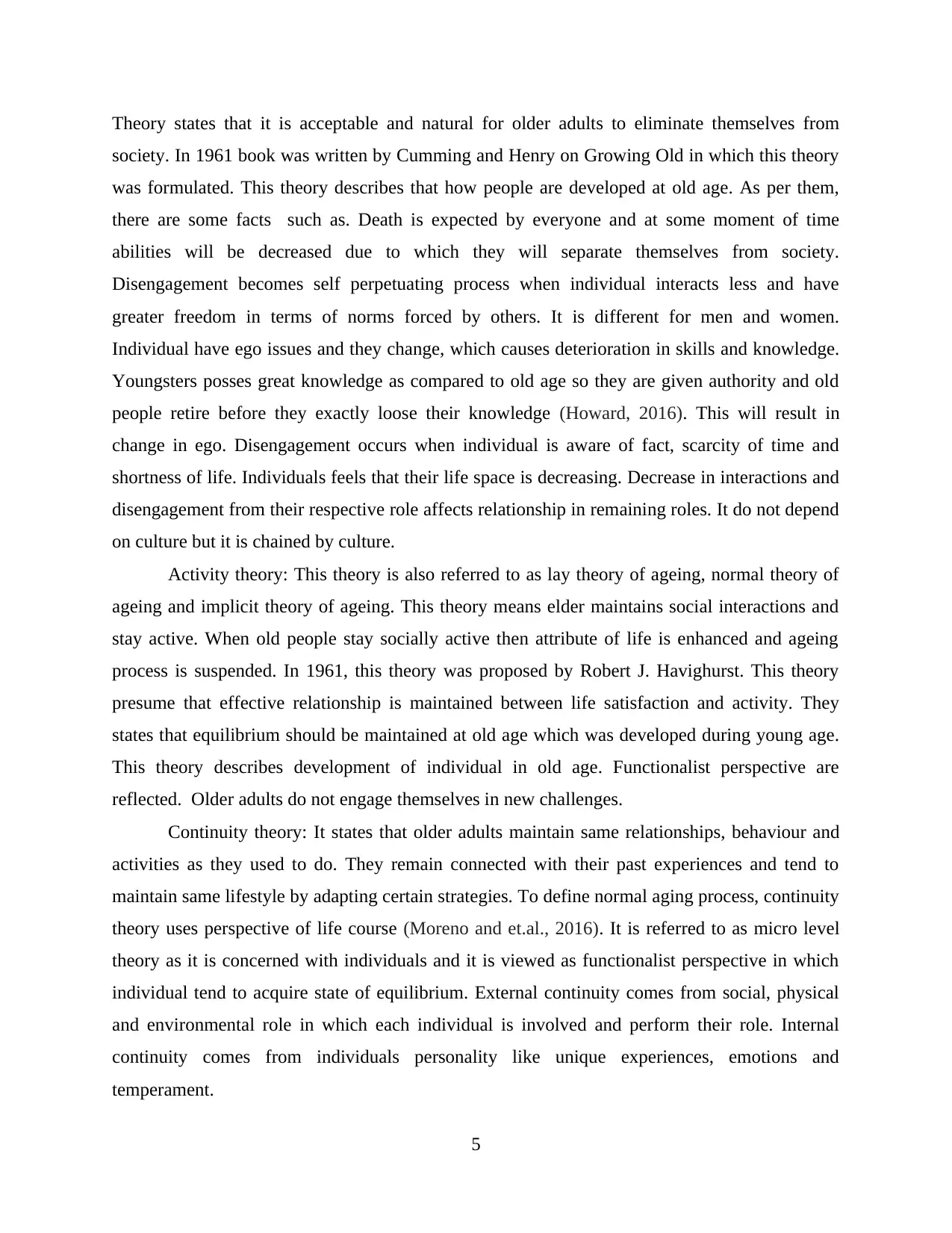
Theory states that it is acceptable and natural for older adults to eliminate themselves from
society. In 1961 book was written by Cumming and Henry on Growing Old in which this theory
was formulated. This theory describes that how people are developed at old age. As per them,
there are some facts such as. Death is expected by everyone and at some moment of time
abilities will be decreased due to which they will separate themselves from society.
Disengagement becomes self perpetuating process when individual interacts less and have
greater freedom in terms of norms forced by others. It is different for men and women.
Individual have ego issues and they change, which causes deterioration in skills and knowledge.
Youngsters posses great knowledge as compared to old age so they are given authority and old
people retire before they exactly loose their knowledge (Howard, 2016). This will result in
change in ego. Disengagement occurs when individual is aware of fact, scarcity of time and
shortness of life. Individuals feels that their life space is decreasing. Decrease in interactions and
disengagement from their respective role affects relationship in remaining roles. It do not depend
on culture but it is chained by culture.
Activity theory: This theory is also referred to as lay theory of ageing, normal theory of
ageing and implicit theory of ageing. This theory means elder maintains social interactions and
stay active. When old people stay socially active then attribute of life is enhanced and ageing
process is suspended. In 1961, this theory was proposed by Robert J. Havighurst. This theory
presume that effective relationship is maintained between life satisfaction and activity. They
states that equilibrium should be maintained at old age which was developed during young age.
This theory describes development of individual in old age. Functionalist perspective are
reflected. Older adults do not engage themselves in new challenges.
Continuity theory: It states that older adults maintain same relationships, behaviour and
activities as they used to do. They remain connected with their past experiences and tend to
maintain same lifestyle by adapting certain strategies. To define normal aging process, continuity
theory uses perspective of life course (Moreno and et.al., 2016). It is referred to as micro level
theory as it is concerned with individuals and it is viewed as functionalist perspective in which
individual tend to acquire state of equilibrium. External continuity comes from social, physical
and environmental role in which each individual is involved and perform their role. Internal
continuity comes from individuals personality like unique experiences, emotions and
temperament.
5
society. In 1961 book was written by Cumming and Henry on Growing Old in which this theory
was formulated. This theory describes that how people are developed at old age. As per them,
there are some facts such as. Death is expected by everyone and at some moment of time
abilities will be decreased due to which they will separate themselves from society.
Disengagement becomes self perpetuating process when individual interacts less and have
greater freedom in terms of norms forced by others. It is different for men and women.
Individual have ego issues and they change, which causes deterioration in skills and knowledge.
Youngsters posses great knowledge as compared to old age so they are given authority and old
people retire before they exactly loose their knowledge (Howard, 2016). This will result in
change in ego. Disengagement occurs when individual is aware of fact, scarcity of time and
shortness of life. Individuals feels that their life space is decreasing. Decrease in interactions and
disengagement from their respective role affects relationship in remaining roles. It do not depend
on culture but it is chained by culture.
Activity theory: This theory is also referred to as lay theory of ageing, normal theory of
ageing and implicit theory of ageing. This theory means elder maintains social interactions and
stay active. When old people stay socially active then attribute of life is enhanced and ageing
process is suspended. In 1961, this theory was proposed by Robert J. Havighurst. This theory
presume that effective relationship is maintained between life satisfaction and activity. They
states that equilibrium should be maintained at old age which was developed during young age.
This theory describes development of individual in old age. Functionalist perspective are
reflected. Older adults do not engage themselves in new challenges.
Continuity theory: It states that older adults maintain same relationships, behaviour and
activities as they used to do. They remain connected with their past experiences and tend to
maintain same lifestyle by adapting certain strategies. To define normal aging process, continuity
theory uses perspective of life course (Moreno and et.al., 2016). It is referred to as micro level
theory as it is concerned with individuals and it is viewed as functionalist perspective in which
individual tend to acquire state of equilibrium. External continuity comes from social, physical
and environmental role in which each individual is involved and perform their role. Internal
continuity comes from individuals personality like unique experiences, emotions and
temperament.
5
Paraphrase This Document
Need a fresh take? Get an instant paraphrase of this document with our AI Paraphraser
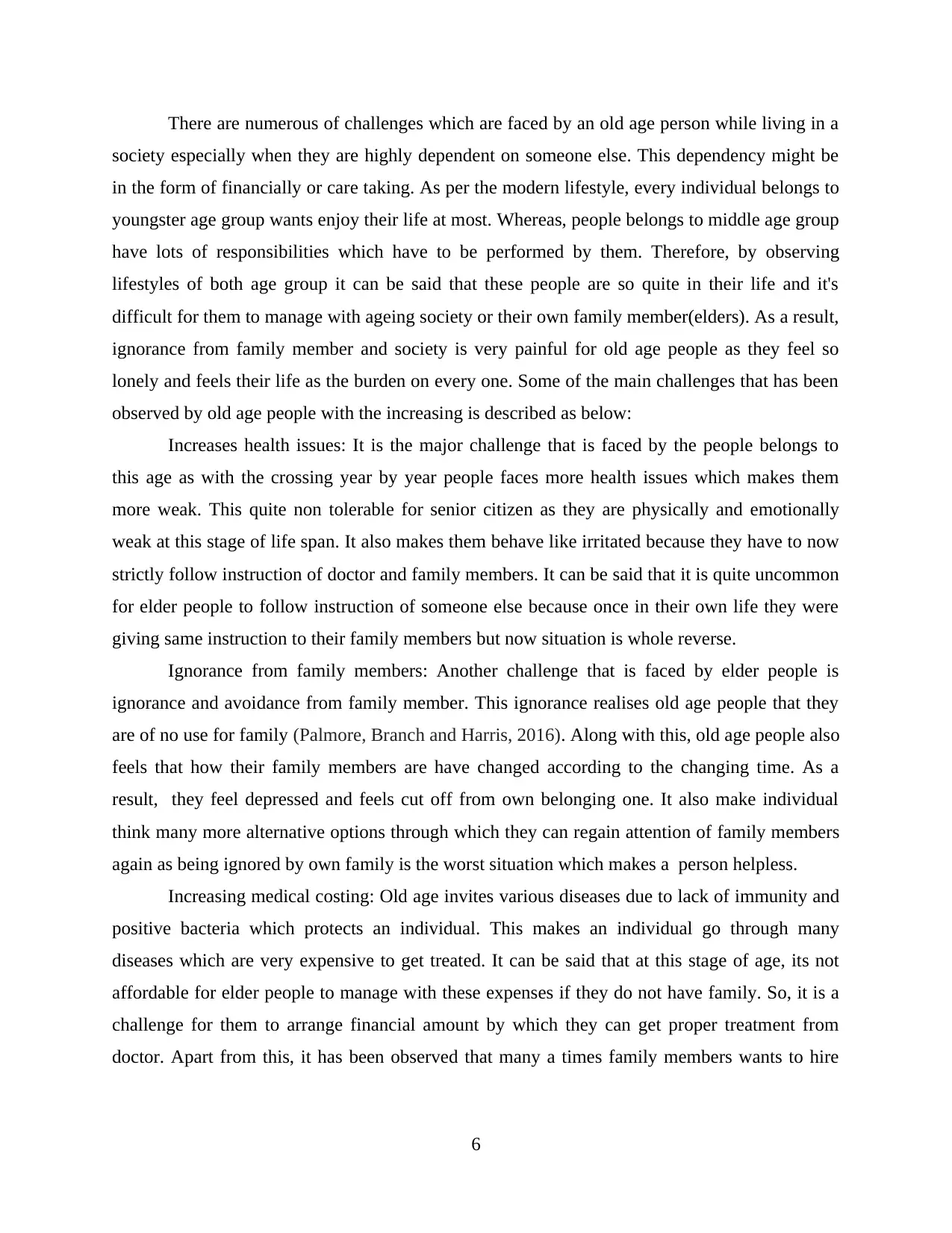
There are numerous of challenges which are faced by an old age person while living in a
society especially when they are highly dependent on someone else. This dependency might be
in the form of financially or care taking. As per the modern lifestyle, every individual belongs to
youngster age group wants enjoy their life at most. Whereas, people belongs to middle age group
have lots of responsibilities which have to be performed by them. Therefore, by observing
lifestyles of both age group it can be said that these people are so quite in their life and it's
difficult for them to manage with ageing society or their own family member(elders). As a result,
ignorance from family member and society is very painful for old age people as they feel so
lonely and feels their life as the burden on every one. Some of the main challenges that has been
observed by old age people with the increasing is described as below:
Increases health issues: It is the major challenge that is faced by the people belongs to
this age as with the crossing year by year people faces more health issues which makes them
more weak. This quite non tolerable for senior citizen as they are physically and emotionally
weak at this stage of life span. It also makes them behave like irritated because they have to now
strictly follow instruction of doctor and family members. It can be said that it is quite uncommon
for elder people to follow instruction of someone else because once in their own life they were
giving same instruction to their family members but now situation is whole reverse.
Ignorance from family members: Another challenge that is faced by elder people is
ignorance and avoidance from family member. This ignorance realises old age people that they
are of no use for family (Palmore, Branch and Harris, 2016). Along with this, old age people also
feels that how their family members are have changed according to the changing time. As a
result, they feel depressed and feels cut off from own belonging one. It also make individual
think many more alternative options through which they can regain attention of family members
again as being ignored by own family is the worst situation which makes a person helpless.
Increasing medical costing: Old age invites various diseases due to lack of immunity and
positive bacteria which protects an individual. This makes an individual go through many
diseases which are very expensive to get treated. It can be said that at this stage of age, its not
affordable for elder people to manage with these expenses if they do not have family. So, it is a
challenge for them to arrange financial amount by which they can get proper treatment from
doctor. Apart from this, it has been observed that many a times family members wants to hire
6
society especially when they are highly dependent on someone else. This dependency might be
in the form of financially or care taking. As per the modern lifestyle, every individual belongs to
youngster age group wants enjoy their life at most. Whereas, people belongs to middle age group
have lots of responsibilities which have to be performed by them. Therefore, by observing
lifestyles of both age group it can be said that these people are so quite in their life and it's
difficult for them to manage with ageing society or their own family member(elders). As a result,
ignorance from family member and society is very painful for old age people as they feel so
lonely and feels their life as the burden on every one. Some of the main challenges that has been
observed by old age people with the increasing is described as below:
Increases health issues: It is the major challenge that is faced by the people belongs to
this age as with the crossing year by year people faces more health issues which makes them
more weak. This quite non tolerable for senior citizen as they are physically and emotionally
weak at this stage of life span. It also makes them behave like irritated because they have to now
strictly follow instruction of doctor and family members. It can be said that it is quite uncommon
for elder people to follow instruction of someone else because once in their own life they were
giving same instruction to their family members but now situation is whole reverse.
Ignorance from family members: Another challenge that is faced by elder people is
ignorance and avoidance from family member. This ignorance realises old age people that they
are of no use for family (Palmore, Branch and Harris, 2016). Along with this, old age people also
feels that how their family members are have changed according to the changing time. As a
result, they feel depressed and feels cut off from own belonging one. It also make individual
think many more alternative options through which they can regain attention of family members
again as being ignored by own family is the worst situation which makes a person helpless.
Increasing medical costing: Old age invites various diseases due to lack of immunity and
positive bacteria which protects an individual. This makes an individual go through many
diseases which are very expensive to get treated. It can be said that at this stage of age, its not
affordable for elder people to manage with these expenses if they do not have family. So, it is a
challenge for them to arrange financial amount by which they can get proper treatment from
doctor. Apart from this, it has been observed that many a times family members wants to hire
6
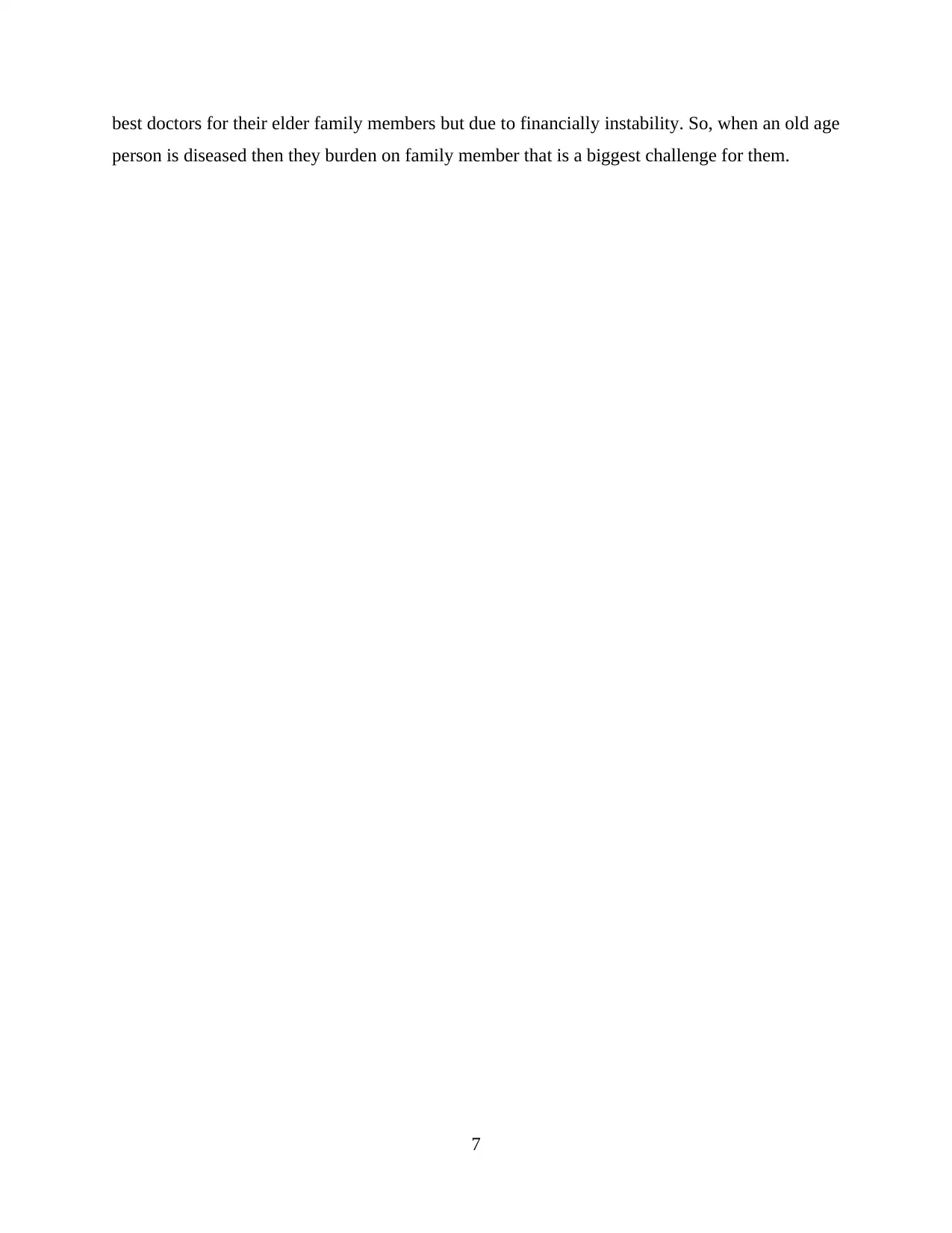
best doctors for their elder family members but due to financially instability. So, when an old age
person is diseased then they burden on family member that is a biggest challenge for them.
7
person is diseased then they burden on family member that is a biggest challenge for them.
7
⊘ This is a preview!⊘
Do you want full access?
Subscribe today to unlock all pages.

Trusted by 1+ million students worldwide
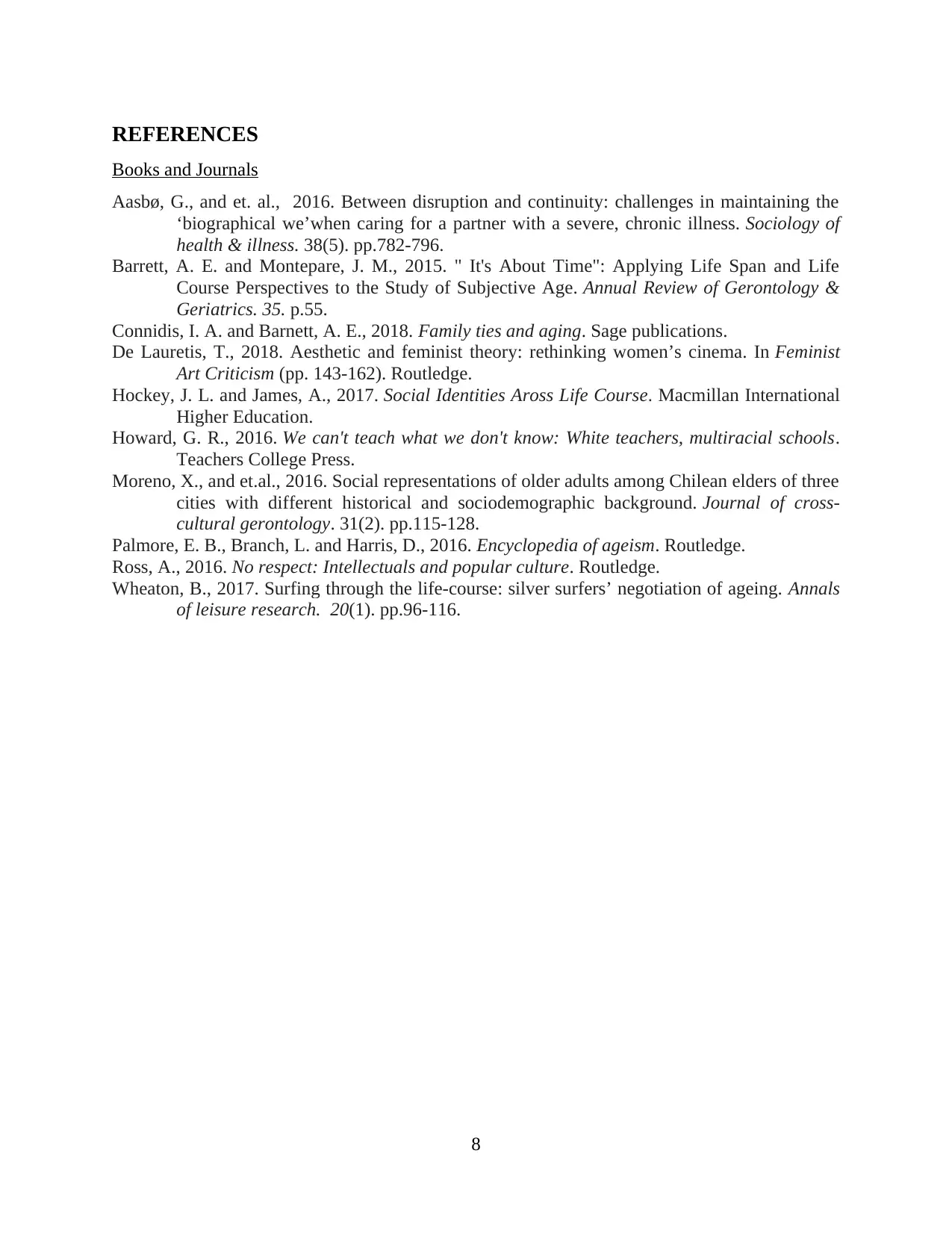
REFERENCES
Books and Journals
Aasbø, G., and et. al., 2016. Between disruption and continuity: challenges in maintaining the
‘biographical we’when caring for a partner with a severe, chronic illness. Sociology of
health & illness. 38(5). pp.782-796.
Barrett, A. E. and Montepare, J. M., 2015. " It's About Time": Applying Life Span and Life
Course Perspectives to the Study of Subjective Age. Annual Review of Gerontology &
Geriatrics. 35. p.55.
Connidis, I. A. and Barnett, A. E., 2018. Family ties and aging. Sage publications.
De Lauretis, T., 2018. Aesthetic and feminist theory: rethinking women’s cinema. In Feminist
Art Criticism (pp. 143-162). Routledge.
Hockey, J. L. and James, A., 2017. Social Identities Aross Life Course. Macmillan International
Higher Education.
Howard, G. R., 2016. We can't teach what we don't know: White teachers, multiracial schools.
Teachers College Press.
Moreno, X., and et.al., 2016. Social representations of older adults among Chilean elders of three
cities with different historical and sociodemographic background. Journal of cross-
cultural gerontology. 31(2). pp.115-128.
Palmore, E. B., Branch, L. and Harris, D., 2016. Encyclopedia of ageism. Routledge.
Ross, A., 2016. No respect: Intellectuals and popular culture. Routledge.
Wheaton, B., 2017. Surfing through the life-course: silver surfers’ negotiation of ageing. Annals
of leisure research. 20(1). pp.96-116.
8
Books and Journals
Aasbø, G., and et. al., 2016. Between disruption and continuity: challenges in maintaining the
‘biographical we’when caring for a partner with a severe, chronic illness. Sociology of
health & illness. 38(5). pp.782-796.
Barrett, A. E. and Montepare, J. M., 2015. " It's About Time": Applying Life Span and Life
Course Perspectives to the Study of Subjective Age. Annual Review of Gerontology &
Geriatrics. 35. p.55.
Connidis, I. A. and Barnett, A. E., 2018. Family ties and aging. Sage publications.
De Lauretis, T., 2018. Aesthetic and feminist theory: rethinking women’s cinema. In Feminist
Art Criticism (pp. 143-162). Routledge.
Hockey, J. L. and James, A., 2017. Social Identities Aross Life Course. Macmillan International
Higher Education.
Howard, G. R., 2016. We can't teach what we don't know: White teachers, multiracial schools.
Teachers College Press.
Moreno, X., and et.al., 2016. Social representations of older adults among Chilean elders of three
cities with different historical and sociodemographic background. Journal of cross-
cultural gerontology. 31(2). pp.115-128.
Palmore, E. B., Branch, L. and Harris, D., 2016. Encyclopedia of ageism. Routledge.
Ross, A., 2016. No respect: Intellectuals and popular culture. Routledge.
Wheaton, B., 2017. Surfing through the life-course: silver surfers’ negotiation of ageing. Annals
of leisure research. 20(1). pp.96-116.
8
1 out of 10
Related Documents
Your All-in-One AI-Powered Toolkit for Academic Success.
+13062052269
info@desklib.com
Available 24*7 on WhatsApp / Email
![[object Object]](/_next/static/media/star-bottom.7253800d.svg)
Unlock your academic potential
Copyright © 2020–2026 A2Z Services. All Rights Reserved. Developed and managed by ZUCOL.





